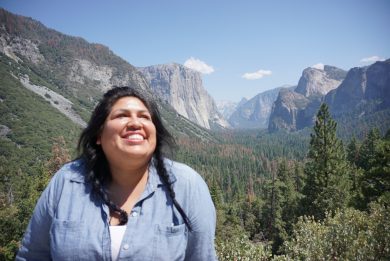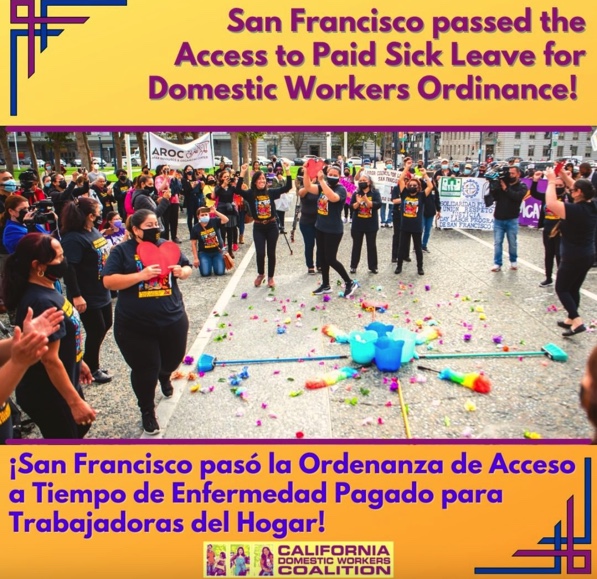 Anny Mogollón is a PhD Student in the Literature Department. Mogollón’s research explores the representation, or misrepresentation, of domestic workers in fiction and multiple other alternative texts, including social media. Mogollón spent last summer as a THI Public Fellow working with the California Domestic Workers Coalition (CDWC).
Anny Mogollón is a PhD Student in the Literature Department. Mogollón’s research explores the representation, or misrepresentation, of domestic workers in fiction and multiple other alternative texts, including social media. Mogollón spent last summer as a THI Public Fellow working with the California Domestic Workers Coalition (CDWC).
In February, we chatted with Mogollón about her research, activism, and the generative intersection of the two. Mogollón plans to incorporate CDEC’s archives, which she worked on as a Public Fellow, into her future research.
Anny, thank you for sitting down and chatting with us about your research and activism! To begin, could you describe your research for us in general terms? What are the major debates and theories that you engage with, and what subjects animate your research?
Thank you! My research looks at the representation of domestic workers in visual and written texts. I use feminist labor theory and scholarship in critical race and ethnic studies, sociology, and cultural studies to critique the lack and (mis)representation of domestic workers in fictional works and the ways that these texts participate in the social imaginary that continues to make domestic workers invisible. I also look towards alternative texts and cultural products that allow domestic workers to represent themselves such as performances, podcasts, or even digital testimonies shared on social media challenging the idea that domestic workers are unable to represent themselves. I find this aspect of my research particularly exciting as it also brings up the question of what shape do these alternative texts take?
Your research sounds so relevant to our contemporary moment. The pandemic brought heightened visibility to “essential” agricultural workers, janitorial workers, childcare providers, and grocery store staff whose contributions to our lives were rarely discussed in popular media until the pandemic. Do you think this new visibility has the potential to combat the erasure of domestic workers you explore in your research? Why or why not?
Domestic workers have been fighting erasure and exclusion for a long time. The pandemic allowed a wider audience to “see” how much we depend on domestic workers, agricultural workers, janitorial workers and others who make up this “invisible” labor force. However, for some of us, whose parents, family members, and neighbors make up this labor force, they were never invisible to us. We saw how they were willfully dismissed and forgotten by the larger society as demonstrated by the unfair working wages and practices and the overall devaluation of their labor. The United States, along with many other countries of the global North, depend on this dismissal in order to maintain these selfsame exploitative practices. Ultimately, while it is important to shed light and ensure that workers are seen, I believe visibility is not enough without actual change that ensures that workers receive the protection and recognition that they deserve.
The pandemic, political unrest, and accusations of “fake news” have deeply problematized social media, causing many of us to reevaluate our choice to use it at all. In regard to your research, do you think social media can still be used purposefully and meaningfully for raising awareness and challenging injustice? How so?
While it is true that social media can be a problematic space, I think of social media as simply one of many tools that we can employ to raise awareness and challenge injustice. Pedagogically, social media challenges how we think about teaching; what we teach, how we approach it, and even our treatment of sites of teaching. In addition, social media has the potential to reach a wide audience in ways that academic articles and texts cannot. It also allows us to participate in memory work that not only connects the past to the present but in doing so can challenge long-standing ideas or raise previously unrecognized knowledge. Even the comment section under a post can be a site for further explanation, inquiry, citational practices, or simply as a space for networking connecting people to other organizations, accounts, or individuals. We can also look at the cultural products that are emerging and being shared through social media: calls for direct action, art pieces memorializing people or events, or short testimonials and how these products contribute to raising awareness of local or global issues and connecting said issues in a transnational conversation.
As a THI 2021 Summer Public Fellow, you worked with the California Domestic Workers Coalition (CDWC) in support of its campaign to improve health and safety for domestic workers in California. Please tell us more about working with this amazing coalition of organizations! What types of projects did you assist with? Can you share with us one of the impactful experiences or stories you encountered while a Public Fellow?

A CDWC Instagram post celebrating paid sick leave for domestic workers in San Francisco.
The CDWC is an amazing coalition that is made up of many great organizations throughout California that are all doing amazing work. There are local organizations such as Mujeres en Acción and La Colectiva in the Bay area and Hand in Hand or CHIRLA in Southern California and many others. During the summer I was able to see the multiple projects that the coalition is collectively working on and just witness the power of collective action. We were all working remotely and I got to assist in a variety of projects from collecting names from interfaith leaders in a letter of support for State Bill 321(Health and Safety for All Workers Act) to preparing educational materials for a public speaking curriculum. I was also part of the social media team and created graphics and captions for future posts (please follow their Instagram: cadomesticworkers). I even submitted a proposal for a future podcast with domestic workers and allies.
One particularly impactful experience was sitting (remotely) in on one of the public speaking training sessions and hearing first-hand the testimonies of compañerxs as they shared their experiences facing wage theft, threats, and abuse but also their desires to create better working conditions for themselves and their fellow compañerxs de trabajo. It was a powerful and beautiful experience.
Your work as a Public Fellow seems intimately and inextricably connected to your research as an academic. How do you envision the relationship between your research and your activism? How did your time as a Public Fellow inform and enrich your research?
As the daughter of a domestic worker I am intimately involved in the CDWC’s fight for the dignity and recognition of domestic workers and that also directly informs my own research project. Early last year, I spoke to a professor about the difficulty in finding texts that center domestic workers and my professor told me, “the texts are coming.” Being in a digital space with the organizers and the workers of the CDWC and being a part of their work was a rewarding experience because it allowed me to see that indeed, the texts are coming. They are being created and collected at this moment. I am so grateful for my summer Fellowship with the CDWC and their willingness to allow me to work on so many diverse projects. At the end of the summer, I was even granted an open invitation to look through their archives for my research which I hope to be able to do in the future.